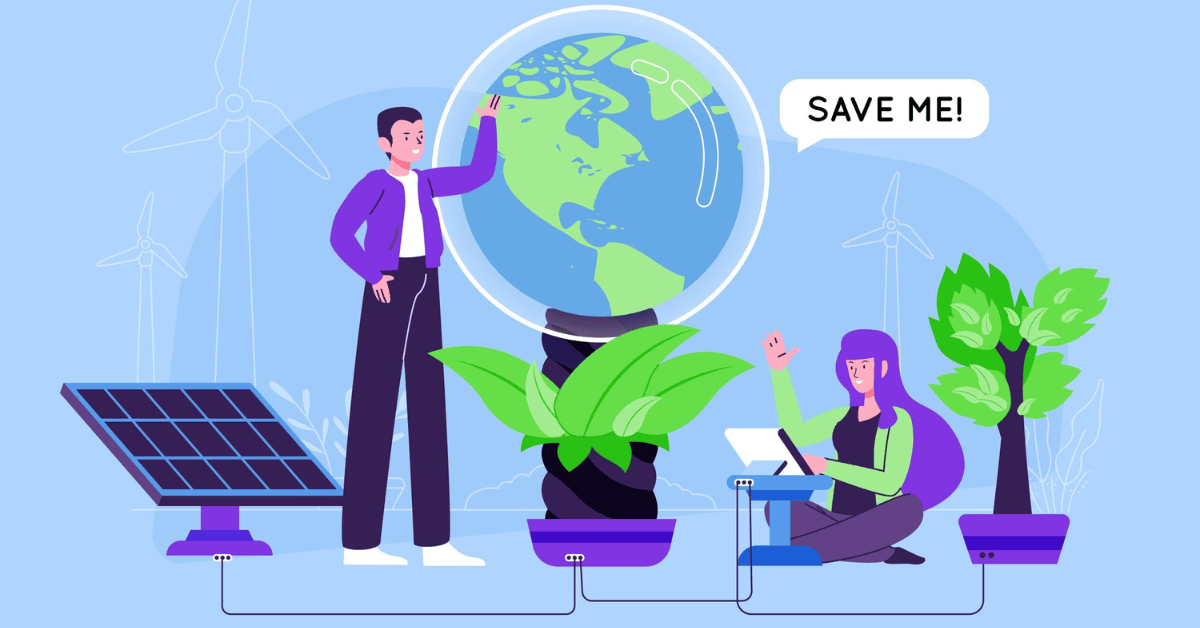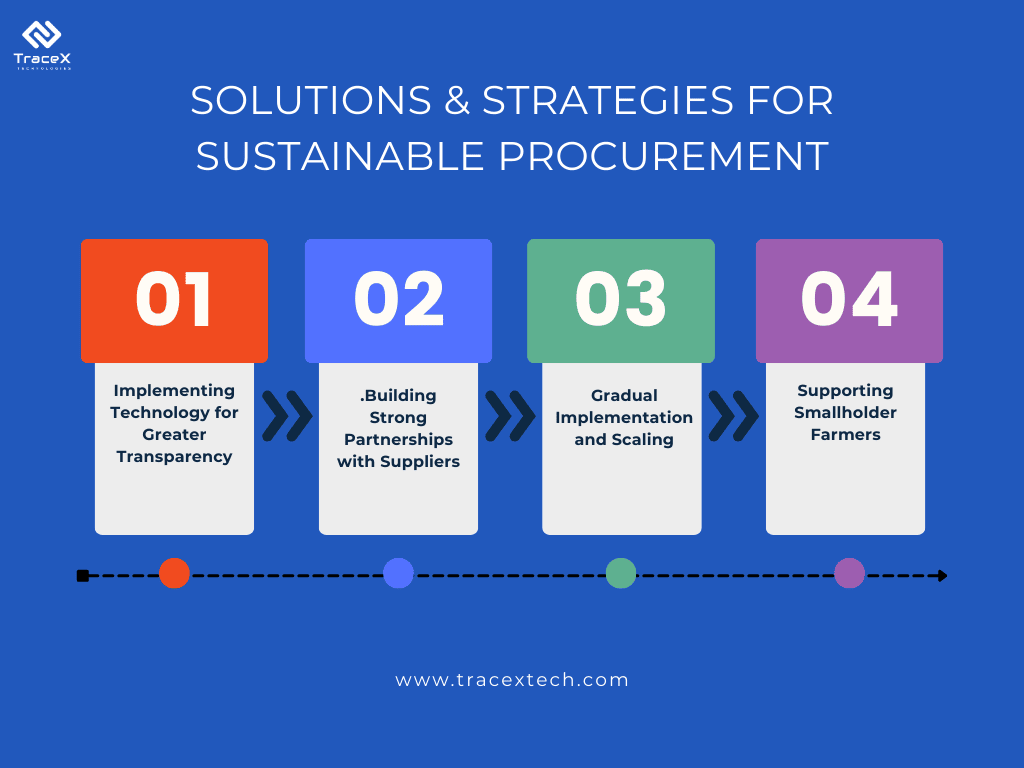Contact: +91 99725 24322 |
Menu
Menu
Quick summary: Discover how sustainable procurement practices, powered by the TraceX EUDR compliance platform, can help your business meet EUDR requirements and drive a responsible, deforestation-free future.

Do you know that, the way you source materials and manage your supply chain can make or break your reputation. Ignoring sustainable procurement practices not only risks your bottom line but also jeopardizes your business’s future in an increasingly eco-conscious market.
Complying with the EU Deforestation Regulation (EUDR) requires agribusinesses to adopt sustainable sourcing practices that ensure their supply chains are free from deforestation. To achieve this, operators and traders need to implement a series of best practices that help them navigate the complexities of global supply chains while maintaining compliance. Let’s explore these best practices in more detail.
Key Takeaways
Sustainable sourcing is all about making conscious choices when acquiring goods and services, ensuring that these practices benefit the environment, society, and the economy. It involves selecting suppliers who follow ethical standards, minimizing negative environmental impacts, and fostering positive social outcomes. The key principles of sustainable sourcing include transparency, where businesses have clear visibility into their supply chains; ethical treatment of workers, ensuring fair wages and safe working conditions; and environmental stewardship, which focuses on reducing carbon footprints and conserving natural resources.
Sustainable sourcing in EUDR is critical as it plays a role in combating deforestation and preserving our planet’s natural ecosystems. By choosing suppliers who practice responsible land management and avoid harmful activities like illegal logging, businesses can significantly reduce their environmental footprint. This approach not only helps in maintaining biodiversity but also contributes to the fight against climate change by preserving forests that act as carbon sinks. Sustainable sourcing encourages the use of renewable resources and promotes the conservation of water and energy, further reducing the environmental impact.
Embracing sustainable sourcing is not just good for the planet—it’s also good for business. Companies that prioritize sustainability often enjoy stronger relationships with consumers, who are increasingly drawn to brands that share their values. Additionally, sustainable practices can lead to cost savings through more efficient resource use and reduced waste. Over time, businesses that invest in sustainable sourcing are better positioned to navigate regulatory changes, avoid supply chain disruptions, and maintain their reputation in a market that increasingly rewards responsibility and ethical behavior. Sustainable sourcing is, therefore, a pathway to long-term business viability and success.
The first step towards sustainable sourcing under EUDR is understanding your supply chain inside and out. This means mapping out the entire supply chain to identify areas where there may be a risk of deforestation. By pinpointing these high-risk areas, companies can take proactive measures to ensure that their raw materials are not contributing to deforestation.
For example, if a company sources cocoa from regions known for illegal land clearing, it should prioritize mapping these areas to identify and mitigate risks. This might involve using satellite imagery or working with local partners to gain a clearer picture of how and where the raw materials are produced. By doing this, businesses can avoid sourcing from regions that don’t meet EUDR’s strict standards.
One of the most effective ways to ensure compliance with EUDR is to work with suppliers who are already committed to sustainable practices. Building strong relationships with certified suppliers—those who have demonstrated their adherence to environmental and social standards—can help operators and traders reduce the risk of deforestation in their supply chains.
When selecting suppliers, businesses should look for certifications that align with EUDR’s requirements, such as those provided by the Rainforest Alliance or Fair Trade. These certifications often involve rigorous audits and standards that ensure the suppliers are operating sustainably. By partnering with certified suppliers, companies can create a more reliable and transparent supply chain, making it easier to meet EUDR’s demands.
Technology plays a crucial role in sustainable sourcing, especially when it comes to ensuring traceability and transparency. By implementing advanced technology solutions like blockchain, satellite monitoring, and digital MRV (Measurement, Reporting, and Verification), companies can gain real-time insights into their supply chains and verify that their products are sourced sustainably.
Blockchain technology provides an immutable record of transactions and movements within the supply chain, making it easier to trace products back to their origins. This ensures that all materials meet sustainability criteria.
For EUDR compliance, blockchain provides a robust solution for traceability. Every step of a product’s journey—from the farm to the final product—can be documented and verified. This level of transparency ensures that all materials are sourced from deforestation-free areas, providing the accountability needed to meet EUDR requirements.
For example, if you’re sourcing soy from Brazil, blockchain can track the entire journey of that soy, verifying that it hasn’t come from land that’s been illegally deforested. This not only helps businesses prove their compliance with EUDR but also builds trust with consumers who are increasingly demanding ethically sourced products.
Satellite monitoring allows companies to keep an eye on land use and deforestation in real time. If deforestation is detected, businesses can quickly take action to prevent non-compliant materials from entering their supply chains.
With satellite monitoring, businesses can track vast areas of land remotely, reducing the need for on-the-ground inspections. This allows for continuous oversight, making it easier to catch and address issues as they arise. For instance, if a satellite image shows new land clearing in an area from which a company sources its palm oil, immediate action can be taken to investigate and halt the sourcing from that region until it’s confirmed to be compliant.
This proactive approach not only helps businesses stay in line with EUDR regulations but also supports broader environmental goals by actively working to prevent deforestation.
TraceX’s EUDR compliance software streamlines deforestation risk management by integrating advanced satellite monitoring solutions into the onboarding process. When users upload a GeoJSON file containing the origin data of their products, the TraceX system automatically validates the file and triggers a deforestation-free check via satellite integration. This seamless integration ensures that every product’s origin is thoroughly analyzed against deforestation risks using real-time satellite data.
By updating the inventory with precise compliance statuses, TraceX empowers businesses to confidently meet EUDR requirements, reducing the risk of non-compliance and supporting sustainable sourcing practices.
Digital MRV systems help companies monitor and report on their carbon footprint, ensuring that their sourcing practices align with broader environmental goals.
For EUDR compliance, Digital MRV systems help businesses monitor their carbon footprint and ensure that their sourcing practices align with sustainability goals. By accurately tracking these metrics, companies can demonstrate their commitment to reducing their environmental impact and meeting the stringent requirements of EUDR.
Moreover, the data collected by Digital MRV systems can be used to make informed decisions about how to improve sustainability practices. For example, if a company’s MRV system shows that a particular supply chain is contributing significantly to carbon emissions, steps can be taken to reduce that impact, such as switching to more sustainable suppliers or investing in carbon offset projects.
Smallholder farmers are a critical part of many agricultural supply chains, but they often face significant challenges in adopting sustainable practices. To help these farmers comply with EUDR, businesses need to provide them with the necessary support, training, and incentives.
This could involve offering training programs that teach smallholders about sustainable farming techniques, providing access to resources like better seeds or farming equipment, or offering financial incentives for those who adopt sustainable practices. By engaging with smallholders and helping them transition to more sustainable methods, companies can ensure that the entire supply chain meets EUDR’s standards.
Additionally, by supporting smallholders, businesses can create a more resilient and sustainable supply chain, reducing the risk of disruptions and ensuring a steady supply of raw materials that comply with EUDR.
Finally, regular audits and monitoring are essential for maintaining compliance with EUDR over the long term. This means conducting periodic checks on suppliers, smallholders, and other parts of the supply chain to ensure that sustainable practices are being followed consistently.
Regular audits help companies identify potential issues before they become major problems, allowing them to take corrective action quickly. Monitoring also ensures that any changes in the supply chain—such as new suppliers or shifts in sourcing regions—are assessed for compliance with EUDR.
By committing to ongoing oversight, companies can maintain their compliance with EUDR and continue to build trust with consumers, stakeholders, and regulators. By following these best practices, operators and traders can navigate the complexities of sustainable sourcing under EUDR, ensuring that their supply chains are not only compliant but also contribute to a more sustainable and ethical global food system.

The TraceX EUDR compliance platform is a powerful tool designed to support businesses in meeting the stringent requirements of the EU Deforestation Regulation (EUDR) through sustainable procurement practices. Here’s how it addresses key challenges:
By leveraging these features, TraceX’s EUDR compliance platform empowers businesses to adopt sustainable procurement practices, engage with suppliers effectively, and ensure that their supply chains are free from deforestation, all while meeting the rigorous demands of the EUDR.
Adopting sustainable procurement practices isn’t just about meeting regulatory requirements—it’s about leading the charge towards a more responsible and transparent future. The TraceX EUDR compliance platform empowers businesses to navigate the complexities of supply chain mapping, supplier engagement, and deforestation-free sourcing with confidence. As the world moves towards stricter environmental standards, ensuring seamless due diligence and compliance reporting will be key to long-term success and sustainability.
The TraceX EUDR compliance platform helps businesses map their supply chains, engage with suppliers, and ensure deforestation-free sourcing through advanced satellite monitoring. It also facilitates seamless due diligence and reporting to the EU Due Diligence System (EU-DDS), ensuring compliance with EUDR regulations.
Satellite monitoring, integrated into the TraceX EUDR compliance platform, allows real-time tracking of land use and deforestation risks. This technology ensures that products are sourced from areas free of deforestation, helping companies meet EUDR requirements and support sustainable practices.
TraceX enables businesses to work closely with suppliers by providing tools for continuous monitoring, transparency, and compliance checks. By mapping the supply chain and identifying high-risk areas, companies can engage suppliers in sustainable practices and ensure adherence to EUDR standards.
